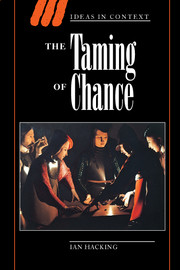Book contents
- Frontmatter
- Contents
- Acknowledgements
- 1 The argument
- 2 The doctrine of necessity
- 3 Public amateurs, secret bureaucrats
- 4 Bureaux
- 5 The sweet despotism of reason
- 6 The quantum of sickness
- 7 The granary of science
- 8 Suicide is a kind of madness
- 9 The experimental basis of the philosophy of legislation
- 10 Facts without authenticity, without detail, without control, and without value
- 11 By what majority?
- 12 The law of large numbers
- 13 Regimental chests
- 14 Society prepares the crimes
- 15 The astronomical conception of society
- 16 The mineralogical conception of society
- 17 The most ancient nobility
- 18 Cassirer's thesis
- 19 The normal state
- 20 As real as cosmic forces
- 21 The autonomy of statistical law
- 22 A chapter from Prussian statistics
- 23 A universe of chance
- Notes
- Index
- Ideas in Context
23 - A universe of chance
Published online by Cambridge University Press: 05 June 2014
- Frontmatter
- Contents
- Acknowledgements
- 1 The argument
- 2 The doctrine of necessity
- 3 Public amateurs, secret bureaucrats
- 4 Bureaux
- 5 The sweet despotism of reason
- 6 The quantum of sickness
- 7 The granary of science
- 8 Suicide is a kind of madness
- 9 The experimental basis of the philosophy of legislation
- 10 Facts without authenticity, without detail, without control, and without value
- 11 By what majority?
- 12 The law of large numbers
- 13 Regimental chests
- 14 Society prepares the crimes
- 15 The astronomical conception of society
- 16 The mineralogical conception of society
- 17 The most ancient nobility
- 18 Cassirer's thesis
- 19 The normal state
- 20 As real as cosmic forces
- 21 The autonomy of statistical law
- 22 A chapter from Prussian statistics
- 23 A universe of chance
- Notes
- Index
- Ideas in Context
Summary
Chance itself pours in at every avenue of sense: it is of all things the most obtrusive. That it is absolute is the most manifest of all intellectual perceptions. That it is a being, living and conscious, is what all the dullness that belongs to ratiocination's self can scarce muster the hardihood to deny.
The Age of Reason, of ratiocination, had seen things differently. Peirce reversed Hume's dictum, ‘that chance, when strictly examined, is a mere negative word, and means not any real power which has anywhere a being in nature’. It wasn't easy. Peirce had tried to settle on half measures.
For a long time I myself strove to make chance that diversity in the universe which laws leave room for, instead of a violation of law, or lawlessness. That was truly believing in chance that was not absolute chance. It was recognizing that chance does play a part in the real world, apart from what we may know or be ignorant of. But it was a transitional belief which I have passed through.
Peirce denied determinism. He also doubted that the world is a determinate given. He laboured in a community seeking to establish the true values of Babbage's constants of nature; he said there aren't any, over and above those numbers upon which we increasingly settle. He explained inductive learning and reasoning in terms of merely statistical stability.
- Type
- Chapter
- Information
- The Taming of Chance , pp. 200 - 215Publisher: Cambridge University PressPrint publication year: 1990
- 2
- Cited by



